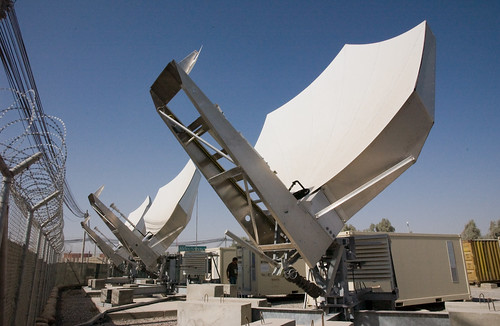Artel Moves Intelsat

Way to get the business, Intelsat. Moving a spacecraft from the U.S. arc to the Indian Ocean Region:
Following an urgent call from the Pentagon’s Joint staff on February 6, Intelsat responded with a solution to reposition one of its domestic U.S. satellites, Galaxy 26, to a new orbital location in the Indian Ocean region. Intelsat began moving Galaxy 26 from its orbital slot at 93 W to its new position on February 20, once the existing commercial traffic assigned to the spacecraft had been shifted to another Intelsat satellite, Galaxy 25. Intelsat was able to begin drifting the Galaxy 26 satellite into its new orbital position only two weeks after the Department of Defense (DoD) request, a demonstration of how quickly the commercial industry can respond to solving critical warfighter requirements.The contract, awarded through Artel Inc. as part of a DoD contract known as the DSTS-G (Defense Information Systems Network Satellite Transmission Services – Global), will fill a military bandwidth void supporting UAV surveillance operations. The repositioned Intelsat satellite will support launch and flight operations of Unmanned Aerial Vehicles (UAVs) deployed in the war zones, as well as other U.S. and NATO military operations in an area reaching from Germany to Southeast Asia."One of the key advantages of the Intelsat fleet is its scale and flexibility," said Kay Sears, President of Intelsat General. "This is the third time we have been able to reposition one of our satellites into a new orbital location to support critical operations on the ground in these two vital regions. Moving this satellite to the Indian Ocean region will prevent the disruption of a range of important military activities in that area."The contract calls for up to 432 MHz of bandwidth using 12 Ku-band transponders operating on the Galaxy 26 satellite, which had most recently been serving North America. The satellite, using wide-beam capability, can support up to 40 UAV sorties simultaneously."This move is of particular importance, since we did not want any service interruptions to the DoD missions and there was no other capacity available to fulfill these requirements without this bold move by Intelsat," said Abbas Yazdani, President and CEO of ARTEL.The demands for bandwidth created by the conflicts in Iraq and Afghanistan previously prompted Intelsat to twice move satellites in support of Intelsat General’s military customers.
Anything to keep the customer happy, but it helps to have a spare communications satellite to work with.